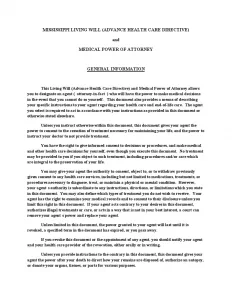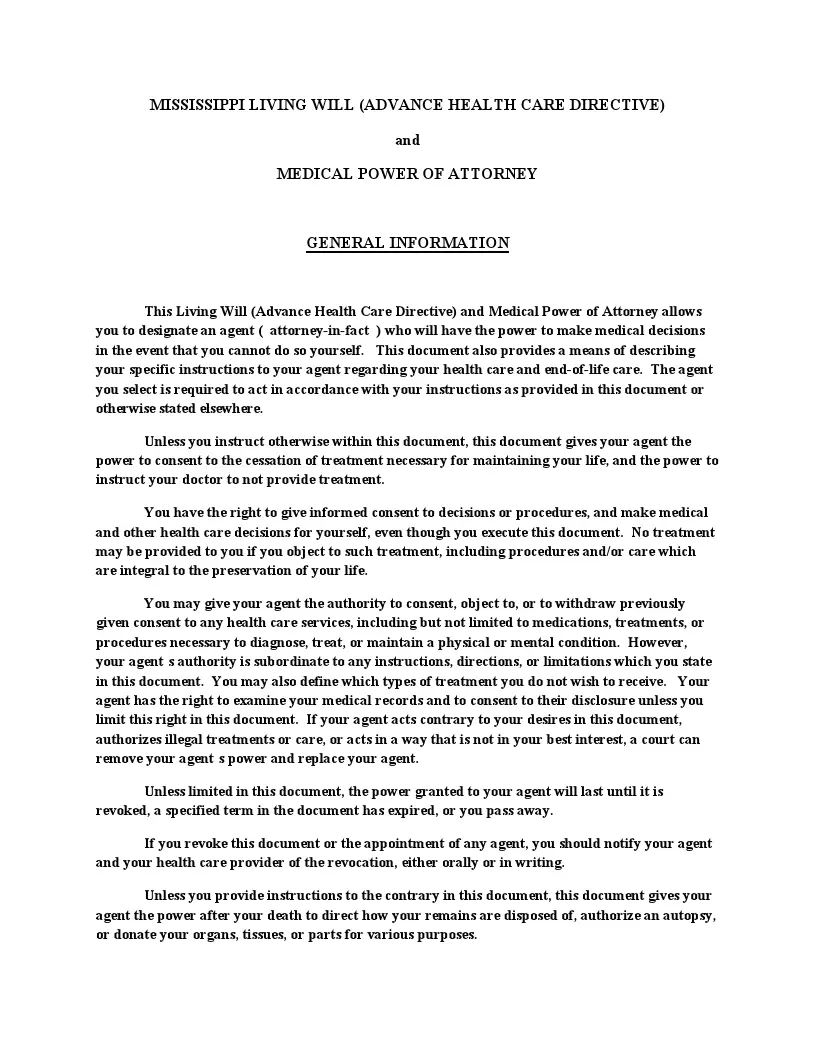Free Mississippi Living Will Form
In Mississippi, a living will, also known as an advance health care directive, is a legal document allowing individuals to state their wishes regarding medical treatment and end-of-life care in advance. This document becomes effective if the person becomes unable to make decisions due to a medical condition.
The Mississippi living will clearly outlines the types of medical treatments and life-sustaining measures the person consents to or refuses. This includes decisions about resuscitation, mechanical ventilation, artificial nutrition and hydration, and other treatments. The living will also establishes a medical power of attorney (a separate but related document), allowing a designated person to make healthcare decisions on the individual’s behalf.
Signing Requirements and Laws
Creating a legally valid living will in Mississippi is governed by specific requirements outlined in Section 41-41-205 of the Mississippi Annotated Code. The individual creating this document, known as the declarant, must be at least 18 years old or an emancipated minor capable of making health care decisions when signed. The living will needs to be in writing and clearly state the individual’s desires regarding the provision, withholding, or withdrawal of medical treatment if they cannot communicate their wishes directly.
The living will must be signed by two competent adult witnesses and notarized. The witnesses must adhere to strict criteria to avoid conflicts of interest:
- They should not be related by blood or marriage to the declarant.
- They cannot be entitled to any part of the declarant’s estate under any will or by operation of law.
- They must not be directly financially responsible for the declarant’s medical care.
- They should not be beneficiaries of the declarant’s life insurance policy.
At any time, the declarant can revoke the living will through a written statement, destruction of the document, or an oral statement to a healthcare provider or two witnesses. Mississippi also recognizes living wills executed in other states if they comply with the laws of that state or meet Mississippi’s legal requirements.
Mississippi Living Will Form Details
| Document Name | Mississippi Living Will Form |
| State Form Name | Mississippi Advance Health Care Directive |
| Signing Requirements | Two Witnesses and Notary Public |
| Validity Requirements | Section 41-41-205 |
| State Laws: Mississippi Code, Sections 41-41-201 to 41-41-229 | |

Popular Local Living Will Forms
Steps to Fill Out the Form
Filling out the Mississippi living will form, officially known as the Advance Health Care Directive, involves several detailed steps.
1. Designate Your Health Care Agent
In Part 1 of the form, designate a primary health care agent by providing their full name, address, and contact information. This person will be responsible for making health care decisions on your behalf. Choosing someone you trust and who understands your health care preferences is important.
2. Appoint an Alternate Agent
You can appoint one or more alternate agents who can take over if your primary agent is unable to fulfill their role. Provide detailed information for each alternate agent as you did for your primary agent, including their names, addresses, and phone numbers.
3. Specify the Scope of Your Agent’s Authority
Detail the extent of the authority granted to your agent. This can include decisions about the provision, withholding, or withdrawal of medical treatment and artificial nutrition and hydration. If there are specific treatments or decisions you want to restrict, clearly state these limitations in the form.
4. Specify When the Agent’s Authority Becomes Effective
Indicate when your agent’s authority to decide on your behalf should begin. Typically, this authority is activated when your primary physician determines you cannot make health care decisions. However, you can choose to have it take effect immediately by marking the appropriate box on the form.
5. Provide Instructions for End-of-Life Care
In Part 2, you can give specific instructions about your health care, particularly regarding end-of-life decisions. This section allows you to state whether you wish to prolong your life in certain conditions or prefer to withhold or withdraw treatment. You can also specify your wishes regarding artificial nutrition and hydration.
6. Designate a Primary Physician
In Part 3, you can designate a primary physician responsible for your health care. Provide the physician’s name, address, and phone number. You can also designate a substitute physician if the primary is unavailable.
7. Sign and Witness the Document
After completing the form, sign and date it at the end. This directive needs to be witnessed by either two qualified adult witnesses or acknowledged before a notary public. The witnesses or notary must verify that you are of sound mind and acting without duress.

Below are various other Mississippi templates completed by our users. Try our simple builder to customize these forms to your preferences.
Other Living Will Forms by State
